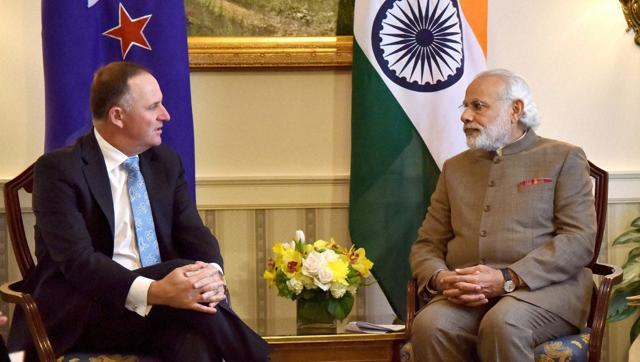At the invitation of Narendra Modi, Prime Minister of India, John Key, Prime Minister of New Zealand, undertook a state visit to India from 25-27 October, 2016. Prime Minister Key was accompanied on his visit by his wife, Bronagh Key, as well as a delegation comprising Parliamentarians. Business people from a range of sectors of bilateral significance, including innovation, technology and tourism; and representatives of New Zealand educational institutions and cultural organizations with interests in India.
About John Key :
John Phillip Key is the 38th Prime Minister of New Zealand, in office since 2008. He has led the New Zealand National Party since 2006.
- Born in Auckland before moving to Christchurch when he was a child, Key attended the University of Canterbury and graduated in 1981 with a bachelor of commerce.
- He began a career in the foreign exchange market in New Zealand before moving overseas to work for Merrill Lynch, in which he became head of global foreign exchange in 1995, a position he would hold for six years. In 1999 he was appointed a member of the Foreign Exchange Committee of the Federal Reserve Bank of New York until leaving in 2001.
- Key entered the New Zealand Parliament representing the Auckland electorate of Helensville as one of the few new National members of parliament in the election of 2002 following National’s significant defeat of that year.
- He has held the seat since then. In 2004, he was appointed Finance Spokesman for National and eventually succeeded Don Brash as the National Party leader in 2006. After two years as Leader of the Opposition, Key led his party to victory at the November 2008 general election, and repeated this feat at both the November 2011 general election and September 2014 general election.
- As Prime Minister, Key leads the Fifth National Government of New Zealand which entered government at the beginning of the late-2000s recession in 2008. In his first term, Key’s government implemented a GST rise and personal tax cuts.
- In February 2011, a major earthquake in Christchurch, the nation’s second largest city, significantly affected the national economy and the government formed the Canterbury Earthquake Recovery Authority in response.
- In its second term, Key’s government announced a policy of partial privatisation of five state-owned enterprises; while the policy was enacted, voters in a citizens-initiated referendum on the issue were 2 to 1 opposed to the policy.
- In foreign policy, Key announced the withdrawal ofNew Zealand Defence Force personnel from their deployment in the war in Afghanistan, signed the Wellington Declaration with the United States and pushed for more nations to join the Trans-Pacific Strategic Economic Partnership.
New Zealand PM to hold talks with PM Modi; NSG issue likely to figure in discussion
New Zealand Prime Minister John Key will hold talks with Prime Minister Narendra Modi in New Delhi and both leaders will discuss ways to further strengthen the bilateral relations.
- India’s entry into the Nuclear Suppliers Group (NSG) is among the gamut of issues that are expected to figure during the meeting.
- John Key, accompanied by a high-level business and education delegation, arrived in the national capital The visit was delayed after his plane broke down en route in the north of Australia.
India, New Zealand ink three agreements including avoidance of double taxation
India and New Zealand have signed three agreements in the areas of double taxation avoidance, food security and sports.
- The agreements were signed in the presence of Prime Minister Narendra Modi and his New Zealand counterpart John Key after the delegation-level talks.
- Terrorism remains one of the greatest challenges to global peace and security and nations who believe in humanity need to coordinate actions. The two sides agreed to strengthen the security and intelligence cooperation against terrorism and radicalization.
- An MoU was signed between the Ministry of Youth Affairs and Sports of India and Sport New Zealand on cooperation in the field of youth affairs and sports.
- Protocol to the convention between India and New Zealand for the avoidance of double taxation and the prevention of fiscal evasion with respect to taxes on income and the two sides also decided to establish a bilateral ministerial dialogue between the two Foreign Ministries.
India, New Zealand agree to strengthen security, intelligence cooperation against terror
India and New Zealand agreed to strengthen ties in key areas of trade, defence and security during talks between Prime Minister Narendra Modi.
- Before raising the issue of terrorism, Modi and Key discussed investment and trade ties between the two countries. They recognised the need for greater economic engagement in order to effectively respond to the growing uncertainties in global economy.
- The two Prime Ministers agreed to enhance cooperation, bilaterally as well as in the framework of UN and especially in 1267 Committee, to combat the full spectrum of terrorist threats in all their forms and manifestations.
- The two sides also agreed that actions by both governments should also promote greater business connectivity, including through movement of skilled professionals, between our two economies and societies.
- In this regard, they agreed to continue to work closely towards an early conclusion of a balanced and mutually beneficial Comprehensive Economic Cooperation Agreement.
New Zealand :
♦ Capital: Wellington
♦ Currency: New Zealand dollar





